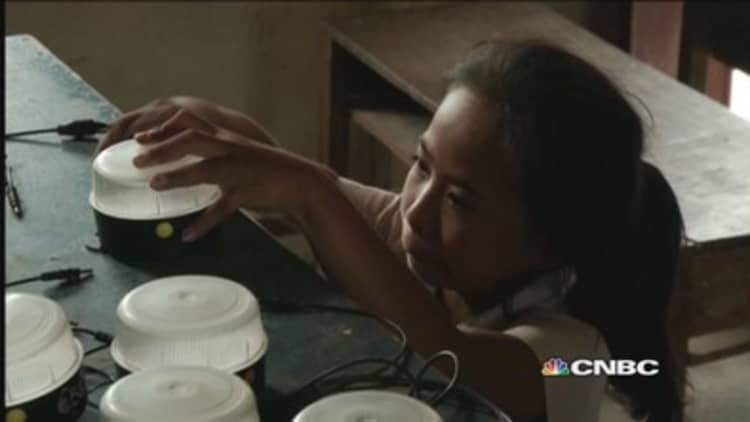
While it may be unpopular, nearly everyone has had to do homework. Yet for those living in communities with no or intermittent access to electricity, the ability to study at home is sometimes a luxury.
Often, children have no choice but to use harmful kerosene lamps to provide light so that they can study during the evening. This is far from ideal. There are a raft of respiratory and health risks associated with using kerosene in the home. The Climate and Clean Air Coalition has stated that, "Users of kerosene lamps pay a huge price in terms of human well-being."
With such conditions, progress at school inevitably stagnates.
Read MoreCan fossil fuels ever be 'guilt-free'?
In Cambodia, French non-profit association Lumières sur le Mékong – or Lights on the Mekong – has been using renewable energy to try and provide an alternative to kerosene lamps as study aids.
The organization provides solar panels to schools in rural Cambodia, where around 90 percent of the country's poor and near-poor live, according to the World Bank.
These panels are used to power lamps and batteries in schools, as well as charge portable lamps that children can take home to use as study aids. Pupils bring the lamps – which are provided by Lumières sur le Mékong and manufactured by Khmer Solar – back to school the next day to re-charge.
"The aim of this action is to improve children's level of education," Laurent Talou, President of Lumières sur le Mékong, told CNBC's Sustainable Energy. "It has been proved around the world that children with access to light have a better academic level than those who don't," he added.
Read MoreAmerica's 'greenest' institutions
Cambodia is a country still coming to terms with the genocide committed by Pol Pot's Khmer Rouge during the 1970s, but when it comes to education, a concerted effort is being made to improve the system and engender reform.
A World Bank administered program, the Cambodia-Education for All Fast Track Initiative, has seen more than 1,200 classrooms built, 11,000 teachers trained, and 900 'early childhood education programs' established.
Yem Phal is a school director in Kambrodes, and has seen the benefits of the Lumières sur le Mékong project first hand. "Since students started using the Khmer Solar lamps at home, their studies have significantly improved," he said.
Read MorePay-as-you-go solar power takes off here
"They can study anywhere that suits them - under or outside their mosquito nets, in and under their houses or under the trees," he added.
"If we didn't offer them electric power for charging the lamps, they wouldn't be so keen on their home studies."




